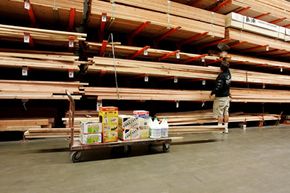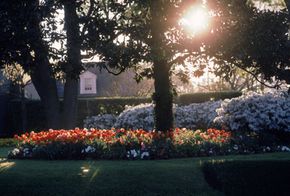When you put your house on the market, you want to get the most for it that you can. This is most crucial in a buyer's market. When lots of homes are up for sale at once and housing prices drop, finding ways to make your home more attractive to prospective buyers can make a real difference toward the bottom line -- perhaps thousands of dollars worth.
There are a number of different ways to increase the value of your home. But choosing home improvement projects that will help out when you want to sell your house is a bit of a gamble. You want to get as much, or more, money from an improvement than you put into it. Consumer advice guru Clark Howard suggests that the best way to get money out of a home improvement investment is to do it yourself. Unfortunately, most large projects go beyond the capabilities of the average homeowner. Howard ultimately suggests that homeowners undertake improvements not to increase their home's value, but to make it a more enjoyable place for them to live [source: The Atlanta Journal-Constitution].
Advertisement
Few home improvements pay for themselves at the closing table -- especially those which involve contractors' labor costs -- but some come closer than others. Since 1987, Remodeling magazine has been conducting an annual survey of the most cost-effective home improvements in the United States. The results are based on the average cost of a project versus the average amount the project increased the home's value. In 2007, the most cost-effective improvement for a mid-range home was the addition of a wooden deck.
Home Improvement Project Image Gallery
Homeowners who installed a 16-by-20-foot pressure-treated wooden deck onto their house recouped an average of 85.4 percent of the cost of the project. On average, a deck which cost $10,347 to build added $8,835 to the value of the home when it was sold [source: Remodeling].
But while adding a wooden deck did provide the largest return on investment for homeowners, it wasn't the improvement that increased the value of a house the most. That honor went to a two-part addition to a home. On average, this project, which put a new family room on one floor and a new bathroom on another, added $103,010 to the resale value of the home. The project cost homeowners an average of $139,297, returning 73.9 percent of the project cost to the homeowner's pocket.
When choosing home improvements, be careful just how far you go. Believe it or not, it's possible to improve the value of your home too much. Real estate insiders advise that before making any major improvements to increase your home's value, take a look around your neighborhood. Is the project you're planning in step with the rest of your neighborhood? For example, adding lavish wrought iron gates to your driveway can increase the value of an upscale home, but in a working-class neighborhood, this may not be the case. Prospective homebuyers may not be able to afford the extra cost you're asking in order to recoup the money you spent on the project.
The point is, when undertaking improvement projects in order to enhance your home's resale value, keep an eye on the market value of your area first.
Of course, home improvement needn't be a $100,000 affair. There are some projects that can lead to great returns on minimal investment. Read the next page to find out about some small steps towards an increased value in your home.
Advertisement

